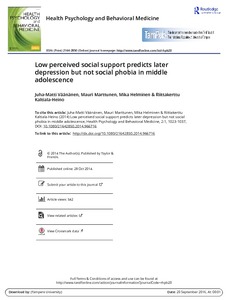Low perceived social support predicts later depression but not social phobia in middle adolescence
Väänänen, Juha-Matti; Marttunen, Mauri; Helminen, Mika; Kaltiala-Heino, Riittakerttu (2014)
Väänänen, Juha-Matti
Marttunen, Mauri
Helminen, Mika
Kaltiala-Heino, Riittakerttu
2014
Health Psychology and Behavioral Medicine 2 1
1023-1037
Lääketieteen yksikkö - School of Medicine
Terveystieteiden yksikkö - School of Health Sciences
Julkaisun pysyvä osoite on
https://urn.fi/URN:NBN:fi:uta-201609202292
https://urn.fi/URN:NBN:fi:uta-201609202292
Kuvaus
This is an open-access article distributed under the terms of the Creative Commons Attribution License http://creativecommons.org/licenses/by/3.0/, which permits unrestricted use, distribution, and reproduction in any medium, provided the original work is properly cited. The moral rights of the named author(s) have been asserted
Tiivistelmä
Abstract
Social phobia and depression are common and highly comorbid disorders in adolescence. There is a lack of studies on possible psychosocial shared risk factors for these disorders. The current study examined if low social support is a shared risk factor for both disorders among adolescent girls and boys. This study is a part of the Adolescent Mental Health Cohort Study's two-year follow-up. We studied cross-sectional and longitudinal associations of perceived social support with social phobia, depression, and comorbid social phobia and depression among girls and boys. The study sample consisted of 2070 15-year-old adolescents at baseline. Depression was measured by the 13-item Beck Depression Inventory, social phobia by the Social Phobia Inventory (SPIN), and perceived social support by the Perceived Social Support Scale-Revised (PSSS-R). Girls reported higher scores on the PSSS-R than boys in total scores and in friend and significant other subscales. Cross-sectional PSSS-R scores were lower among adolescents with social phobia, depression, and comorbid disorder than among those without these disorders. Low PSSS-R total score and significant other subscale were risk factors for depression among both genders, and low support from friends among girls only. Low perceived social support from any source was not a risk factor for social phobia or comorbid social phobia and depression. As conclusion of the study, low perceived social support was a risk factor for depression, but not a shared risk factor for depression and social phobia. Interventions enhancing perceived social support should be an important issue in treatment of depression.
Social phobia and depression are common and highly comorbid disorders in adolescence. There is a lack of studies on possible psychosocial shared risk factors for these disorders. The current study examined if low social support is a shared risk factor for both disorders among adolescent girls and boys. This study is a part of the Adolescent Mental Health Cohort Study's two-year follow-up. We studied cross-sectional and longitudinal associations of perceived social support with social phobia, depression, and comorbid social phobia and depression among girls and boys. The study sample consisted of 2070 15-year-old adolescents at baseline. Depression was measured by the 13-item Beck Depression Inventory, social phobia by the Social Phobia Inventory (SPIN), and perceived social support by the Perceived Social Support Scale-Revised (PSSS-R). Girls reported higher scores on the PSSS-R than boys in total scores and in friend and significant other subscales. Cross-sectional PSSS-R scores were lower among adolescents with social phobia, depression, and comorbid disorder than among those without these disorders. Low PSSS-R total score and significant other subscale were risk factors for depression among both genders, and low support from friends among girls only. Low perceived social support from any source was not a risk factor for social phobia or comorbid social phobia and depression. As conclusion of the study, low perceived social support was a risk factor for depression, but not a shared risk factor for depression and social phobia. Interventions enhancing perceived social support should be an important issue in treatment of depression.
Kokoelmat
- Artikkelit [6140]
